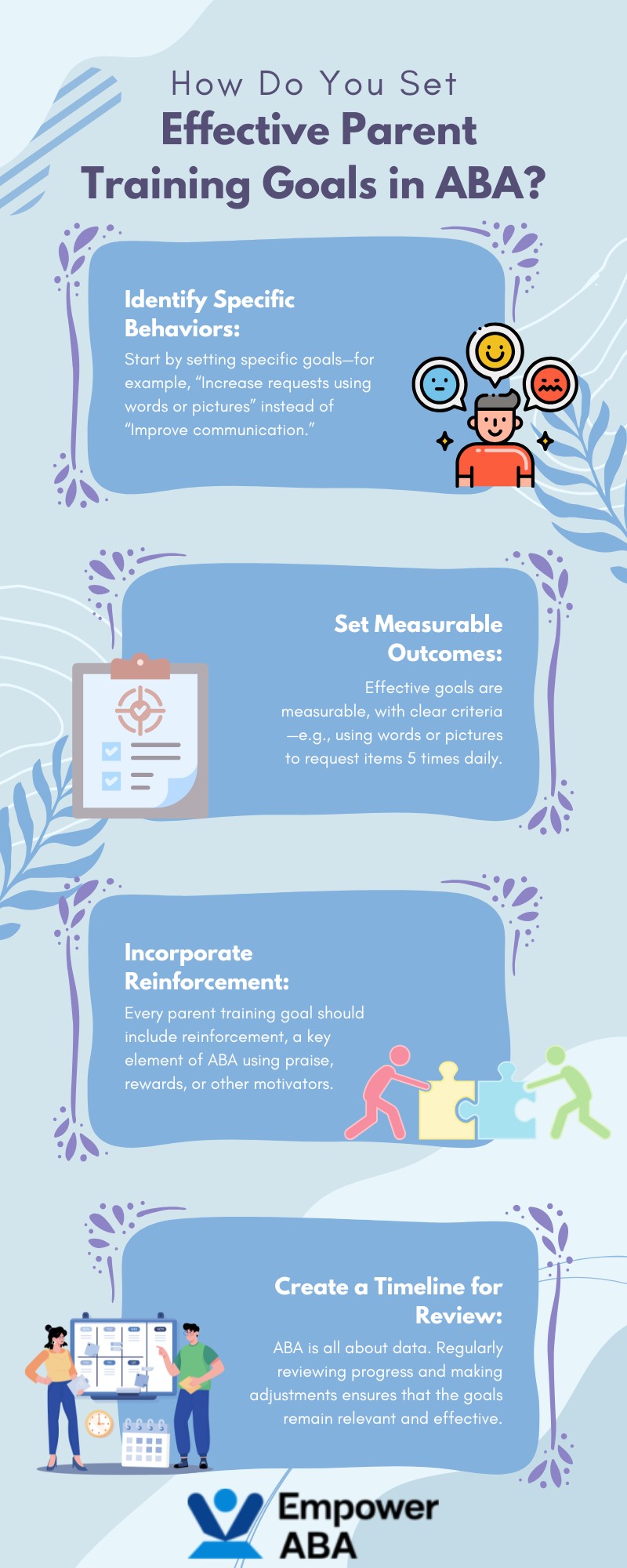Key Points:
- Parent training goals in ABA are essential for success in therapy and achieving lasting behavioral changes.
- Setting specific, measurable, and realistic goals helps parents navigate their child’s development effectively.
- Effective ABA therapy training emphasizes practical, everyday skills that improve both the child’s and family’s quality of life.
Setting parent training goals in ABA means being actively involved in your child’s progress. It’s about learning techniques that not only address behavioral challenges but also improve everyday life. Clear goals empower parents to support their child’s development, making a positive impact both in therapy sessions and at home.
Why Are Parent Training Goals Important in ABA?
Parent training goals in ABA are not just an add-on to therapy; they’re a foundational element of it. The role parents play in their child’s success cannot be overstated. Without consistent and active participation at home, even the most effective ABA programs can fall short.
Setting goals for parent training allows parents to understand the “why” behind behavioral interventions and how these tactics align with their child’s needs. When parents understand the underlying principles of ABA, they’re better equipped to apply techniques in everyday situations. This is particularly important because it leads to a seamless integration of ABA therapy strategies into the family’s routine, making them more sustainable and effective.
Parents who actively participate in training feel more confident and empowered in their caregiving role. This confidence directly translates into better outcomes for the child, as the parents are not just passive recipients of information but active participants in the child’s growth.

By following these steps, parents can set achievable goals that foster meaningful change in their child’s behavior while also reinforcing positive family dynamics.
What Types of Goals Should Parents Focus On in ABA Therapy?
Parent training goals in ABA should focus on key areas that will improve both the child’s behavior and the family’s overall functioning. It’s important to break these down into practical, manageable targets that align with the child’s developmental stage. Here are some of the core goal areas:
- Communication Skills: One of the most common goals for children undergoing ABA therapy is improving communication. Parents might set a goal for their child to use simple words or gestures to express their needs, reducing frustration and promoting social interaction.
- Social Skills Development: ABA often targets social skills, especially for children who struggle with peer interaction. Parents can set goals such as initiating a play interaction with a peer or responding appropriately to social cues.
- Self-Regulation and Emotional Control: Many children with behavioral challenges struggle with self-regulation. Parent training in ABA can help parents set goals that teach their children strategies for managing frustration, anxiety, or anger in healthy ways.
- Functional Living Skills: These include basic life skills such as dressing, eating, and toileting. Parent training goals in this area can be crucial for promoting independence in children.
Each of these goal areas can be tailored to the child’s unique needs, ensuring that ABA therapy is focused on what matters most for both the child and the family.
How Can Parents Measure Progress in ABA?
Measuring progress in ABA therapy is essential to ensuring that the parent training goals are working. Here are a few ways parents can track success:
- Data Collection: ABA therapy is heavily data-driven. Parents are encouraged to collect data on the targeted behaviors, such as frequency counts, duration, or latency. This data helps track progress and adjust interventions when necessary.
- Parent Journals or Logs: Keeping a daily log or journal is a great way for parents to document observations, successes, challenges, and any patterns they notice in their child’s behavior. This ongoing documentation also provides valuable feedback to therapists during review sessions.
- Regular Reviews with ABA Therapists: Scheduled meetings with ABA therapists allow for a collaborative review of progress. These meetings provide an opportunity for parents to share their observations and for therapists to offer guidance on adjusting techniques if necessary.
- Consistency and Routine: Success often hinges on how consistently strategies are applied. Tracking whether the techniques are consistently implemented at home provides insight into the effectiveness of parent training.
Tracking progress with these methods ensures that parents can see the results of their efforts, reinforcing positive behaviors and helping to adjust strategies when needed. The key to success is regular monitoring and making incremental adjustments to reach the ultimate goals.
How Can ABA Therapy in Virginia, New Jersey, and New York Help Your Child?
Are you looking for expert ABA therapy in Virginia, New Jersey, or New York? At Empower ABA, we specialize in providing personalized ABA therapy that helps children and families thrive. Our approach emphasizes parent training goals in ABA to ensure that you have the support and tools you need to create a positive, lasting impact on your child’s development.
Our team of experienced professionals works closely with you, setting clear and measurable goals, tracking progress, and ensuring consistency at home. ABA therapy has proven to be highly effective in treating a range of developmental challenges, and with our guidance, you can be confident that you’re making the best possible choice for your child’s growth.
Contact us today to start your journey toward meaningful change for your child!

